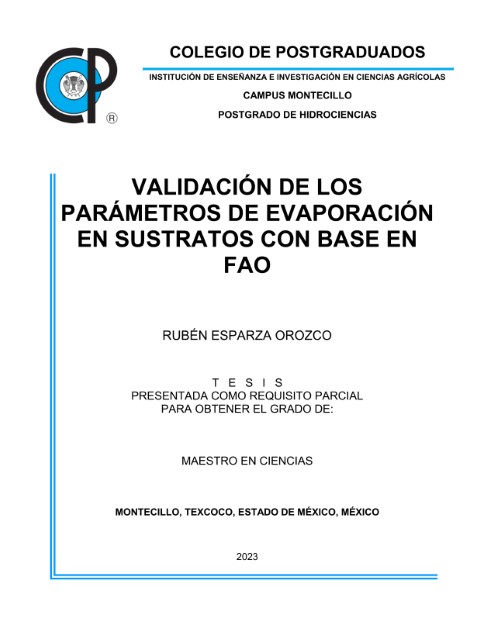
Fecha: 2023-09
Estudiante: RUBÉN ESPARZA OROZCO
MAESTRÍA EN CIENCIAS - HIDROCIENCIAS
RUBÉN ESPARZA OROZCO, M. C. Colegio de Postgraduados, 2023/09
RESUMEN
El modelo de evaporación de agua en la superficie del suelo FAO, considera que
está ocurre en dos etapas: en la primera la evaporación de agua del suelo se
limita por la cantidad de energía disponible en el ambiente y la segunda se
caracteriza por la reducción de la tasa de evaporación a causa de una menor
disponibilidad de agua en el suelo. Ambas etapas de evaporación se identificaron
en la superficie de los medios porosos: Tezontle al 100% (T100), Peatmoss al
100% (P100%) y una Mezcla de relación volumétrica 1:1 (M); por cada medio se
hicieron dos repeticiones. La identificación de ambas etapas de evaporación
permitió cuantificar los parámetros de evaporación: Agua Fácilmente Evaporable
(AFE) y Agua Evaporable Total (AET). El parámetro de evaporación AFE tienen un
rango de 1.7 - 13.48 mm para los tres medios analizados. En los suelos, este
parámetro tiene un rango de 2 a 12 mm. Similarmente, el parámetro de evaporación
AET se determinó en un rango de 17.33 a 56.01 mm, en los suelos este parámetro
tiene un rango entre 6 a 29 mm. Durante la etapa 2 de evaporación, en los tres
tratamientos se observó que el coeficiente de reducción, Kr, no decrece
linealmente con el contenido de humedad. Por lo que, el modelo FAO 56 difiere
con respecto al Kr observado durante esta etapa de evaporación. Se ajustaron dos
modelos polinómicos y uno potencial para describir el coeficiente de reducción
Kr. Se describe la implementación del mini lisímetro que se utilizó para la
medición de las láminas de agua evaporada. El mismo cuenta con instrumento para
pesar cumple con los requisitos metrológicos de exactitud Clase III, y cuenta
con una superficie expuesta del contenedor de 710.2 cm, que permitieron medir
láminas de agua evaporada con 0.014 mm de precisión.
Palabras clave: Evaporación de agua, sustratos, lisímetro.
VALIDATION OF EVAPORATION PARAMETERS BASED ON FAO
RUBEN ESPARZA OROZCO, M. C. Colegio de Postgraduados, 2023/09
ABSTRACT
The FAO model of water evaporation on the soil surface considers that
this occurs in two stages: in the first, the evaporation of water from
the soil is limited by the amount of energy available in the environment,
and the second is characterized by the reduction of the evaporation rate
due to less water availability in the soil. Both evaporation stages are
identified on the surface of the porous media: 100% Tezontle (T100),
100% Peatmoss (P100%) and a 1:1 volumetric ratio Mixture (M); Two
repetitions were made for each medium. The identification of both
evaporation stages allowed quantifying the evaporation parameters:
Easily Evaporable Water (AFE) and Total Evaporable Water (AET). The AFE
evaporation parameter has a range of 1.7 - 13.48 mm for the three
analyzed media. In soils, this parameter has a range of 2 to 12 mm.
Likewise, the evaporation parameter AET is calculated in a range of
17.33 to 56.01 mm, in soils this parameter has a range between 6 to 29
mm. During stage 2 of evaporation, in the three treatments it is
observed that the reduction coefficient, Kr, does not decrease linearly
with the moisture content. Therefore, the FAO 56 model differs with
respect to the Kr observed during this evaporation stage. Two polynomial
models and one potential model were fitted to describe the reduction
coefficient Kr. The implementation of the mini lysimeter used to measure
the sheets of evaporated water is described. It has a weighing
instrument that meets the metrological requirements for Class III
accuracy, and has an exposed surface of the container of 710.2 cm2,
which allowed the measurement of sheets of evaporated water with 0.014
mm precision.
Keywords: Water evaporation, substrates, lysimeter.